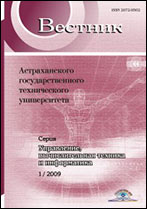|
MANAGEMENT, MODELING, AUTOMATION
Principles of formal classification theory of technical systems: case of energy facilities
N. V. Fedorova
Platov South-Russian State Polytechnic University (NPI),
Novocherkassk, Rostov region, Russian Federation
Abstract:
The article describes the power generating and other energy facilities as complex technical systems interacting with the material, financial, informational and legal environment. To ensure functioning and development of a technical system it is important to determine its place among other technical systems: technical systems and their elements must be classified. There have been presented the principles of formal theory of technical system classification. The classification objects have been given a definition. The concepts of classification, classification attribute and meaning of the classification attribute are formalized. The goal and tasks of the classification are formulated. The stages of forming and applying classifiers include developing the composition and structure of classifier kernel, marking interpretation elements and selecting an element corresponding to the user's request. The alphabet, inference rules, axioms and main theorems of the classification formal theory are presented. It is proved that a complete consistent independent classification theory is decidable. The taxonomy of the classifier types is considered: elementary (incomplete and complete), basic (discrete hierarchical, discrete matrix, continuous band), complex (combined and limiting). Examples of using classifiers of various types in the description of energy objects are given. The algorithms, labeling and selection problems are considered. The use of a grounded and structured classification theory allows better understanding and description of the relationship between technical and related systems and l increases the efficiency of functioning and development of technical systems.
Keywords:
technical systems, classification, formal theory, energy objects and systems.
Received: 29.12.2020
Citation:
N. V. Fedorova, “Principles of formal classification theory of technical systems: case of energy facilities”, Vestn. Astrakhan State Technical Univ. Ser. Management, Computer Sciences and Informatics, 2021, no. 2, 7–19
Linking options:
https://www.mathnet.ru/eng/vagtu665 https://www.mathnet.ru/eng/vagtu/y2021/i2/p7
|

| Statistics & downloads: |
| Abstract page: | 72 | | Full-text PDF : | 41 | | References: | 10 |
|




 Contact us:
Contact us: Terms of Use
Terms of Use
 Registration to the website
Registration to the website Logotypes
Logotypes







 Citation in format
Citation in format 